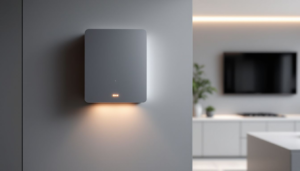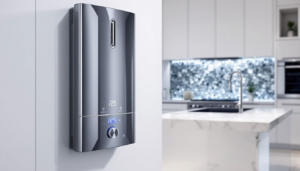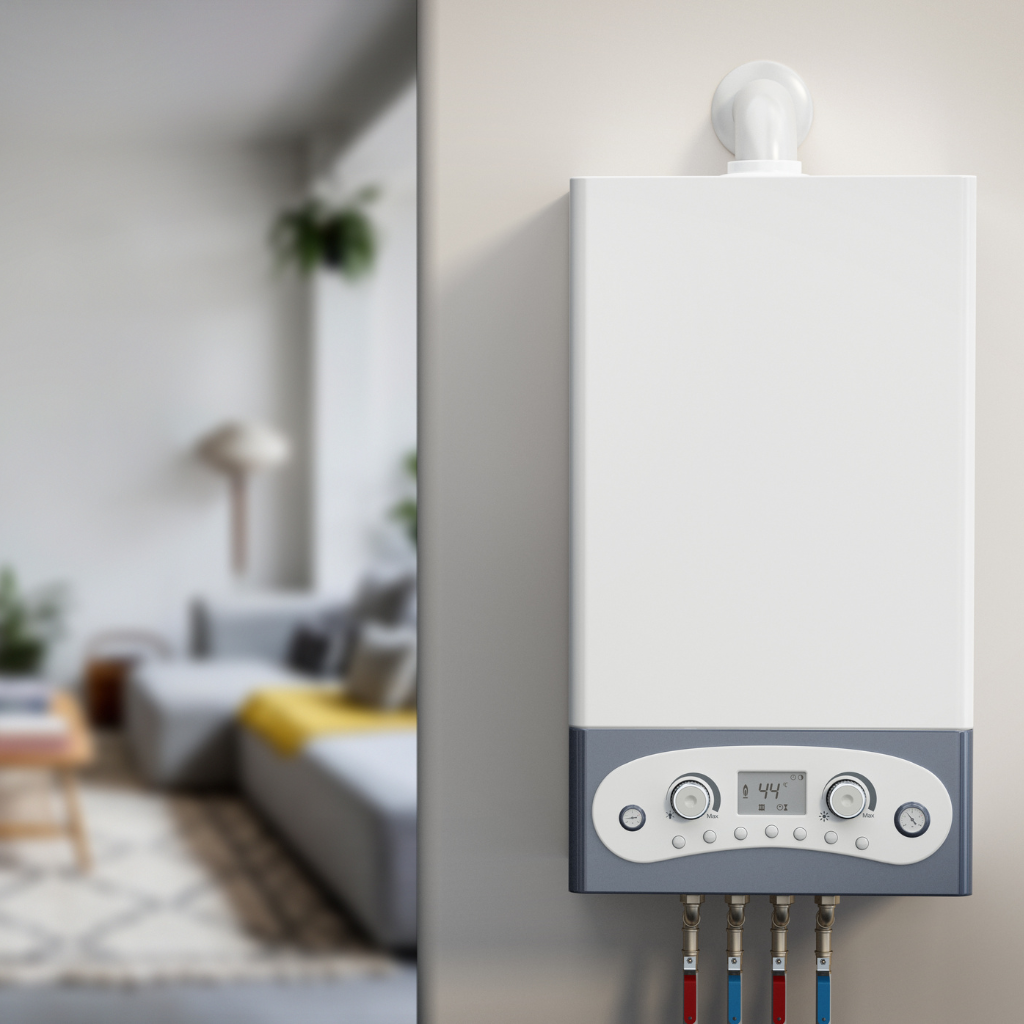Curious if a tankless water heater is worth it? Tankless water heaters heat water only when you need it, saving energy and space. This guide reviews their benefits and types, to help you make an informed choice.
 Essential Insights
Essential Insights
- Tankless water heaters provide on-demand hot water without the need for a storage tank, increasing efficiency and saving space.
- They come in gas and electric types, with gas models typically offering higher flow rates suitable for larger households.
- Tankless heaters are energy-efficient, offering substantial long-term cost savings despite higher initial investment, and they often last over 20 years with proper maintenance.
A tankless water heater heats water only when necessary, eliminating the need for a storage tank. Traditional heaters keep a constant hot water supply, whereas tankless models heat water on-demand as it passes through coils, providing instant hot water. This eliminates waiting for a tank to refill and reheat, offering a continuous hot water supply.
Another advantage is their compact size. Tankless water heaters are smaller and more efficient, unlike traditional ones that occupy significant space in basements or utility rooms. They provide endless hot water on demand without the bulk of a storage tank.
Types of Tankless Water Heaters
Tankless water heaters come in various types, primarily categorized by their fuel source: electric, liquid propane, and natural gas. Each type has unique characteristics and operational costs. Electric models usually have a lower flow rate than gas-fired ones, affecting their hot water supply during peak usage. On the other hand, gas tankless water heaters often provide higher flow rates, making them suitable for larger households.
Choosing between gas and electric models also influences the unit’s size and capacity. Condensing tankless heaters, available in both types, are more energy-efficient as they use gas for heating.
In larger households, multiple tankless water heaters can be installed in parallel to meet higher simultaneous hot water demands.
 Advantages of Tankless Water Heaters
Advantages of Tankless Water Heaters
A major benefit of tankless water heaters is their energy efficiency. Electric models can reach up to 99% efficiency, greatly outperforming conventional electric heaters. Natural gas models are about 23% more efficient than traditional gas storage heaters, making them a smart choice for reducing energy consumption.
Since they don’t store hot water, tankless water heaters minimize heat loss, enhancing overall efficiency. This feature, coupled with their ability to provide a continuous supply of hot water, makes them ideal for households with high water usage. Their compact design also allows for wall mounting, freeing up valuable floor space.
Tankless water heaters are also known for their longevity, often lasting over 20 years and coming with longer warranties averaging around 15 years. This extended lifespan, combined with their efficiency, makes tankless water heaters a cost-effective investment in the long run.
 Gas Tankless Water Heaters
Gas Tankless Water Heaters
Brands like Rinnai stand out for their reliable and energy-efficient gas tankless water heaters and gas water heaters. Models like the Rinnai RU160iN and Rheem RTGH-95DVLN have Energy Factor ratings over 0.90, reflecting high efficiency. These heaters offer a continuous hot water supply, ideal for families with high demand.
Customer reviews often highlight the exceptional performance and ease of installation of gas tankless water heaters installed by TCR Rooter & Plumbing. Known for their expertise in gas models, TCR ensures that each installation meets the highest standards, providing reliable hot water solutions for households. Many gas tankless heaters come with warranties for parts and labor, typically lasting from 1 to 15 years, adding to their appeal.
Why We Don’t Install Electric Tankless Water Heaters
While electric tankless water heaters have their advantages, such as compact design and precise temperature control, they may not be the best fit for every household. At TCR Rooter & Plumbing, we focus on providing solutions that offer the highest efficiency and cost-effectiveness for our customers. Gas tankless water heaters often outperform electric models in terms of flow rate and energy efficiency, making them a more suitable choice for larger households or those with higher hot water demands.
Electric models can struggle to meet the hot water needs during peak usage times, particularly in colder climates where the incoming water temperature is lower. Additionally, the installation of electric tankless water heaters may require significant electrical upgrades to accommodate the increased power demands, which can lead to higher installation costs.
By specializing in gas tankless water heaters, we ensure our customers receive a reliable, efficient, and cost-effective solution tailored to their specific needs. Our expertise in gas models allows us to deliver exceptional service and performance, ensuring a continuous supply of hot water for your home.
 Choosing the Right Model for Your Home
Choosing the Right Model for Your Home
Selecting the right tankless water heater involves several considerations. Understanding the flow rate, which indicates the highest volume of hot water the heater can provide at any given time, is crucial. Gas-powered models usually have higher hot water flow rates than electric ones, suitable for larger households with higher hot water demands.
When sizing a tankless water heater, consider the maximum flow rate and the desired temperature rise to ensure adequate supply. Overloading a tankless heater with too many applications can cause it to struggle or shut down, indicating a need for reduced demand or a higher capacity unit. In homes with multiple bathrooms or high-demand appliances, installing multiple units might be necessary to meet household needs effectively.
Consider the total BTU needs based on your household’s hot water consumption. This helps determine the heater’s capacity to supply hot water based on local cold water temperatures. Considering these factors will help ensure you select the right model for your home.
Installation Considerations
Proper installation is crucial for safety and optimal performance. Installation must comply with local and national codes, and it’s recommended to use qualified professionals like TCR Rooter & Plumbing. Improper installation poses risks like fire or asphyxiation, making professional services essential.
Common issues include blocked air supply or exhaust, triggering error codes and requiring vent pipe inspection and clearance. Ignition failures may stem from gas supply issues, like an empty propane tank or closed gas valves. Proper venting and addressing electrical issues can prevent flame failures and other operational problems.
Maintenance Tips for Longevity
Maintaining your tankless water heater ensures longevity and optimal performance. Regular flushing removes mineral buildup that can impair the heater’s function. Flush the heater at least once a year if you have soft water, and more frequently if you have hard water. A vinegar solution can effectively remove minerals as an organic descaler.
Descaling prevents clogs from mineral deposits, ensuring efficient operation. Always turn off the power source before maintenance to ensure safety. Closing water valves before maintenance prevents water from entering the unit during inspection.
Tankless water heaters often come with warranties averaging around 15 years. This extended lifespan, along with regular maintenance, makes them a durable and cost-effective choice.
Energy Efficiency and Cost Savings
Tankless water heaters are energy-efficient, providing hot water only when needed and eliminating standby energy losses. Operating only when hot water is required significantly reduces energy consumption. This efficiency can lead to substantial annual savings on utility costs, with gas-fired models saving an average of $108 annually compared to traditional ones.
Electric tankless heaters also contribute to cost savings, typically reducing energy costs by about $44 per year compared to standard storage heaters. Though tankless water heaters have higher initial costs, their long-term savings on energy bills make them a worthwhile investment.
Energy efficiency ratings like the Energy Factor (EF) help consumers assess the performance of different models. For example, the Rinnai Ruin Super High-Efficiency Plus has an EF rating of up to 0.96, ensuring significant energy savings. Understanding these ratings helps customers choose the most efficient unit for their needs.
Common Issues and Troubleshooting
Despite their high efficiency, tankless water heaters can occasionally encounter issues. One common problem is the ‘cold water sandwich’ phenomenon, occurring when back-to-back showers cause a temporary blast of cold water due to residual cold water in the pipes. To prevent this, stagger hot water usage or install a re circulation system to reduce wait time.
Other common issues can affect performance. For instance, ignition failures may stem from gas supply issues, like an empty propane tank or closed gas valves. Addressing these problems promptly and ensuring proper installation and maintenance can help maintain performance and longevity.
Tankless Water Heater Accessories
Accessories can boost the performance and longevity of your tankless water heater. Smart thermostats, for instance, optimize temperature settings, allowing for improved energy efficiency. Water softeners reduce mineral buildup in tankless systems, ensuring consistent performance and extending the heater’s lifespan.
Other useful accessories include pressure regulators to maintain consistent water pressure, and heat exchangers to enhance energy transfer efficiency. Regular use of a descaling solution can prevent mineral deposits, ensuring optimal operation and longevity.
Comparing Brands: Which One is Right for You?
Several leading brands offer a variety of tankless water heater models to suit different needs. Rinnai specializes in high-efficiency models with features like Circ-Logic technology for quicker hot water delivery. Bosch is known for compact designs and intelligent electronics that provide consistent hot water temperatures.
Stiebel Eltron focuses on electric models, noted for quiet operation and advanced flow control. Navien’s products feature advanced condensing technology, significantly enhancing energy efficiency. EcoSmart offers budget-friendly, compact models with self-modulating technology. Rheem tankless heaters are recognized for balancing performance and affordability.
Each brand has unique strengths, and the right choice depends on your specific needs and budget. For instance, Rinnai’s high-efficiency models are noted for their reliability and customer satisfaction, while Bosch and other brands have received positive feedback concerning the reliability of their products.
Tankless water heaters offer numerous benefits, including energy efficiency, continuous hot water supply, and compact design. Both gas and electric models have their unique advantages, and choosing the right type depends on your household’s needs and budget. Leading brands like Rinnai, Rheem, and Bosch provide reliable and efficient options to suit various requirements.
Investing in a tankless water heater can lead to significant cost savings and a more efficient home. Regular maintenance and the use of appropriate accessories can further enhance their performance and longevity. Considering all these factors will help you make an informed decision and enjoy the many benefits of a tankless water heater.
Frequently Asked Questions
What is a tankless water heater?
A tankless water heater provides instant hot water by heating water on demand without the need for a storage tank. This system allows for a constant hot water supply while saving energy.
Are tankless water heaters more energy efficient than traditional models?
Tankless water heaters are indeed more energy efficient than traditional models, as they heat water on demand and avoid standby energy losses. This efficiency can lead to lower energy bills and a more sustainable choice for your home.
How do I choose the right tankless water heater for my home?
To choose the right tankless water heater, evaluate your flow rate requirements, BTU needs, and your household’s overall hot water consumption. This will ensure the heater effectively meets your specific demands.
What are common issues with tankless water heaters?
Common issues with tankless water heaters include the ‘cold water sandwich’ effect, where short bursts of cold water come between hot water, and ignition failures stemming from gas supply problems. Addressing these issues ensures optimal performance and comfort.
How often should I perform maintenance on my tankless water heater?
You should perform maintenance on your tankless water heater at least once a year, including flushing and descaling, to prevent mineral buildup and maintain optimal performance.


